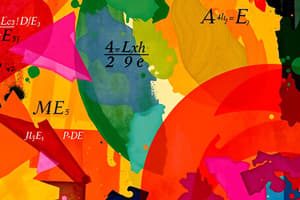Podcast
Questions and Answers
What is the purpose of pinion depth in a differential assembly?
What is the purpose of pinion depth in a differential assembly?
- To adjust the gear tooth relationship between the ring and pinion gears. (correct)
- To adjust the clearance between the drive pinion gear and ring gear.
- To ensure proper preload on side bearings.
- To modify friction characteristics of rear axle lubricant.
What can cause wear to the pinion gear thrust washers?
What can cause wear to the pinion gear thrust washers?
- Excessive tire spinning or different tire sizes. (correct)
- Improper preload of tapered roller bearings.
- Incorrect drive pinion depth.
- Backlash variation over 0.002 inch.
How can correct drive pinion depth be determined?
How can correct drive pinion depth be determined?
- Through wear pattern analysis, markings on the drive pinion, or gauging set and depth micrometer. (correct)
- By transferring shims or turning threaded adjusters.
- By placing thicker shims between housing and differential.
- By using an additive to modify friction characteristics of rear axle lubricant.
What is the purpose of preloading side bearings in a differential assembly?
What is the purpose of preloading side bearings in a differential assembly?
How is backlash corrected in a differential assembly?
How is backlash corrected in a differential assembly?
Which lubricant is commonly used in most differentials?
Which lubricant is commonly used in most differentials?
What is the purpose of an additive in a limited-slip differential?
What is the purpose of an additive in a limited-slip differential?
What is the purpose of the tooth contact pattern test in a differential assembly?
What is the purpose of the tooth contact pattern test in a differential assembly?
What are the methods used to support the final drive pinion shaft in a differential assembly?
What are the methods used to support the final drive pinion shaft in a differential assembly?
What is included in differential assembly identification?
What is included in differential assembly identification?
What does a grinding or growling noise while turning indicate in a differential assembly?
What does a grinding or growling noise while turning indicate in a differential assembly?
Flashcards are hidden until you start studying
Study Notes
- The drive pinion gear of the drive axle is driven by a companion flange.
- Two methods are used to support the final drive pinion shaft: overhung and straddle-mounted.
- Pinion depth helps adjust the gear tooth relationship between the ring and pinion gears.
- Side bearings are pressed onto the differential case and preloaded to ensure rotation without movement.
- Axle specifications must be determined before any service work is performed.
- Differential assembly identification includes visual identification, axle assembly number, limited-slip identification tag, and differential cover shape.
- The axle ratio of a differential can be determined without removing the housing cover.
- Excessive tire spinning or different tire sizes can cause wear to the pinion gear thrust washers.
- Grinding or growling noise while turning indicates a defective axle bearing.
- Whine noise during cruise indicates drive pinion bearings are the likely cause.
- Visual and noise analysis tests are used to check for axle assembly problems.
- Tooth contact pattern test checks for proper drive pinion depth and backlash.
- Tapered roller bearings require proper preload for support and positioning of pinion shaft.
- Preload shims or collapsible spacer are used to ensure proper drive pinion gear preload.
- Correct drive pinion depth can be determined through wear pattern analysis, markings on the drive pinion, or gauging set and depth micrometer.
- Backlash is the clearance between the drive pinion gear and ring gear and should not vary over 0.002 inch.
- Backlash is corrected by transferring shims or turning threaded adjusters.
- Thicker shims are placed between housing and differential to provide for proper preload on side bearings.
- Gear lubes are specified by API and most differentials require SAE 80W-90 GL-5, SAE 75W-90 GL-5, or SAE 80W GL-5.
- Limited-slip differentials use an additive to modify friction characteristics of rear axle lubricant.
Studying That Suits You
Use AI to generate personalized quizzes and flashcards to suit your learning preferences.




